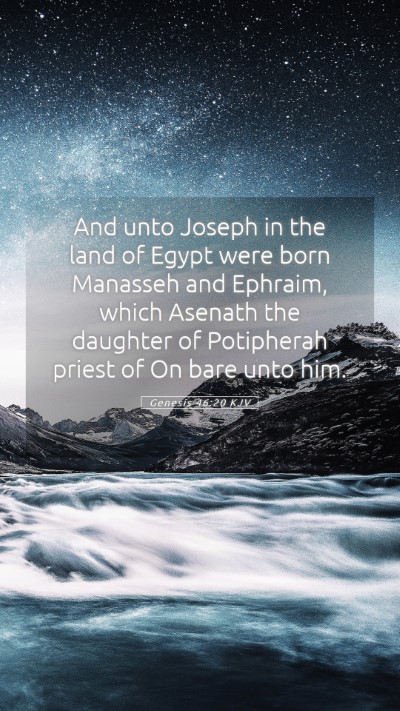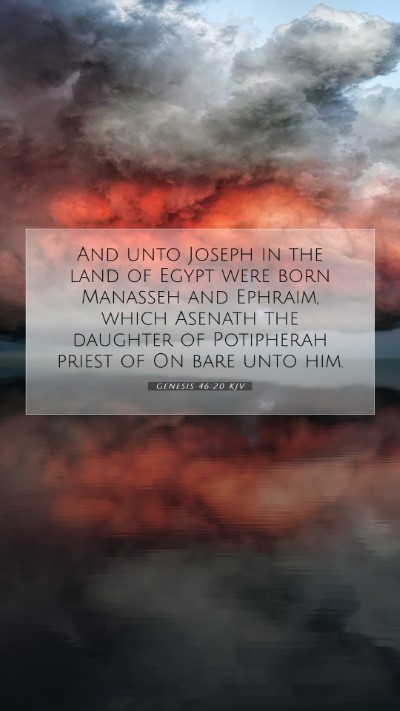Bible Verse Meaning and Interpretation: Genesis 46:20
Genesis 46:20: "And unto Joseph in the land of Egypt were born Manasseh and Ephraim, which Asenath the daughter of Potipherah priest of On bare unto him."
This verse gives a brief mention of Joseph’s family in Egypt, highlighting the birth of his two sons, Manasseh and Ephraim. The text carries significant implications regarding God's promises, lineage, and the unfolding narrative of Israel's history.
Understanding the Scripture
In analyzing Genesis 46:20, we uncover profound meanings that resonate through various lenses of Biblical exegesis. Through the insights of esteemed public domain commentators like Matthew Henry, Albert Barnes, and Adam Clarke, we gain a multidimensional view of this verse.
Insights from Commentaries
-
Matthew Henry:
Henry notes the significance of the names Manasseh and Ephraim. Manasseh, meaning "causing to forget," symbolizes Joseph’s ability to leave his past hardships behind. Ephraim, meaning "fruitful," represents the blessings Joseph experienced in Egypt, signifying God’s provision in his life.
-
Albert Barnes:
Barnes emphasizes the prophetic nature of Joseph’s sons, indicating that they would become two tribes within Israel, thus playing key roles in the nation’s future. The mention of Asenath’s lineage, as the daughter of a priest, also brings to light the integration of the Egyptians and Hebrews, suggesting divine orchestration in familial and national identity.
-
Adam Clarke:
Clarke draws attention to the cultural context of Joseph's marriage to Asenath, which could symbolize the blending of cultures and God's broader plans for His people in Egypt, pointing towards future events in the Exodus narrative. He also discusses familial blessings and divine favor as a recurring theme in the life of Joseph.
Bible Verse Explanations
The mention of Joseph's sons unveils critical aspects of blessing and lineage in the Old Testament. This verse serves as a precursor to understanding how these tribes became instrumental in the story of Israel.
Historical and Cultural Significance
To fully grasp Genesis 46:20, it is essential to consider the historical context of Jacob's family moving to Egypt. This migration set the stage for the Hebrews' eventual enslavement and the ensuing liberation narrative, illustrating God's providence and the fulfillment of His promises.
Bible Study Insights
Engaging with this verse is vital for Bible study groups and individuals alike, providing a platform for discussions on divine fulfillment, the significance of names in Scripture, and genealogical importance in God's redemptive plan.
Applications of this Verse
As we reflect on the applications of Genesis 46:20, it's crucial to consider how the blessings bestowed upon Joseph and his sons can inspire modern believers. Understanding our past while embracing the blessings in our present is a profound principle derived from this passage.
Cross References
- Genesis 48:1-22: Jacob’s blessings over Manasseh and Ephraim reveal their importance in the Israelite heritage.
- Numbers 1:32-33: The tribes of Ephraim and Manasseh are counted among the Israelites, illustrating their continued significance.
- Deuteronomy 33:13-17: Moses' blessings include references to the fruitful nature of the tribes descended from Joseph.
Conclusion
In summary, Genesis 46:20 holds rich layers of meaning and significance, illustrating themes of redemption, heritage, and divine provision. It challenges readers to deepen their understanding through rich Bible verse explanations and interpretations.
As we seek to enrich our Bible study insights, may we approach such passages with a heart open to learning and growth, pondering the profound implications of our scriptural heritage.


